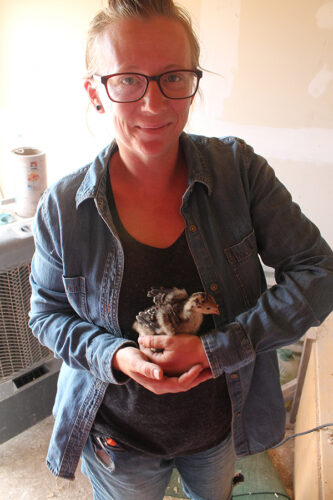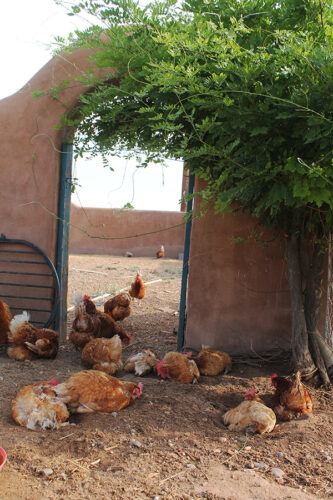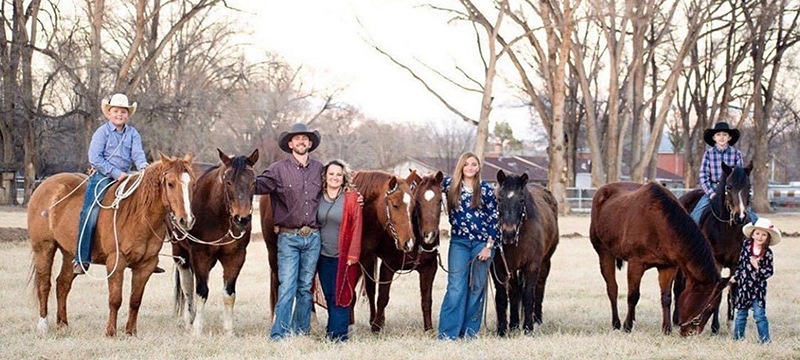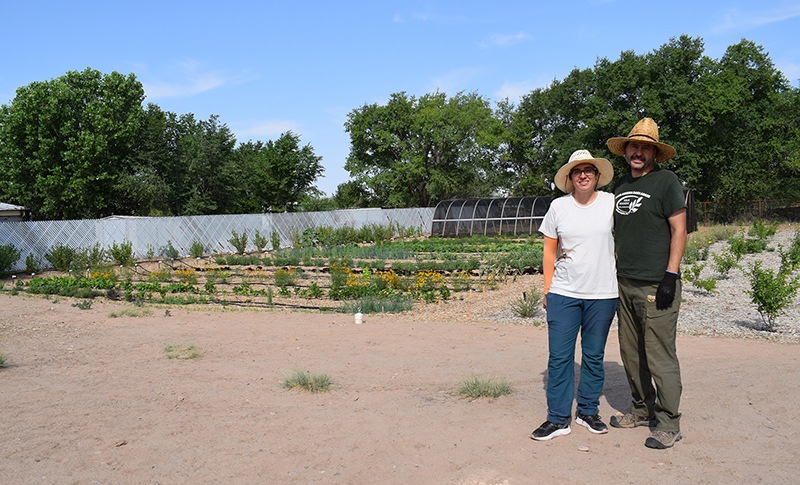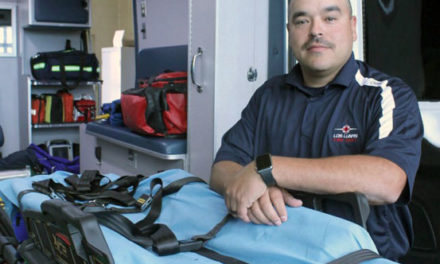The sound of the traffic on N.M. 47 fades and the temperature drops as you walk further back through the pastures at Kirsten and Nathan Couevas’ small farm in Adelino.
Fluffy red hens who have temporarily escaped their enclosure scratch and scavenge in the short grass while New Zealand heritage kunekune pigs grunt and chuff as they graze.
Nathan stops to check on a pregnant sow; she nimbly lays down for belly rubs.
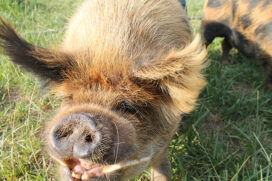
Julia M. Dendinger | News-Bulletin photos
The tusks of a kunekune boar might look imposing, but the pigs tend to have mellow personalities. Kirsten and Nathan Couevas, owners of Sublime Pastures, raise and breed the New Zealand heritage meat pigs as a part of their regenerative farm.
“That’s why I decided to call it ‘Sublime Pastures,’” Kirsten says. “It’s so peaceful and tranquil back here.”
Set on four acres that originally belonged to her grandparents, the couple is three years into a life-changing regenerative farming project.
Regenerative farming is a holistic approach to managing land, crops and livestock. It is interwoven and cyclical in nature.
The couple raises cows, pigs and chickens that will ultimately be used for meat. In turn, the cows graze on the tall grasses, pigs come through and eat the lower broad leaf plants and the chickens finish off the small stuff.
All the animals also provide fertilizer through their urine and feces, as well as doing natural, minimal disturbance just by walking around the paddocks.
“The chickens are three days behind the cows in the paddocks, and they pick apart the cow patties and eat any larvae, so we really don’t have any flies or pests,” Kirsten said.
Kirsten has two rare autoimmune disorders — stiff person syndrome and relapsing remitting MS. With few options for treatment available, she started looking at non-traditional medicine and treatments.
“I couldn’t eat any (commercially-raised) meats. Then, I found regenerative farming, so I took over the property and I was like, ‘Well, that’s what we’re going to do,’” Kirsten said. “I decided I was going to raise my own meat because I have problems eating everywhere. It’s no fun when food is your enemy.”
Since she’s begun raising and eating her own food, Kirsten said both of her disorders are in full remission.
“That’s why we do the regenerative planting,” she said. “We’re in the first three years and still in the blood and sweat part.”
Her family is originally from the land grant near Las Vegas, N.M., and eventually her grandfather moved to Las Vegas, Nev., where he met Kirsten’s grandmother.
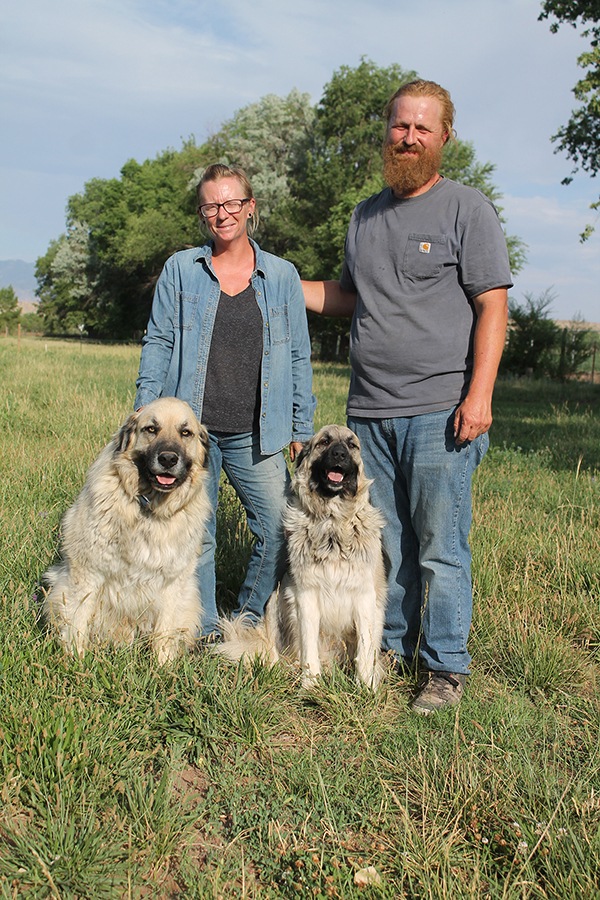
Julia M. Dendinger | News-Bulletin photo
Kirsten and Nathan Couevas started Sublime Pastures in Adelino three years ago. Their two dogs, Ace and Faith, are the guardian dogs that look after the chickens, pigs and cows on the farm.
When he retired, the couple moved back to New Mexico, settling in Adelino. Kirsten, who was raised by her grandparents, visited family in the Albuquerque area frequently as a child and fell in love with the Rio Grande Valley.
There are five basic principals to regenerative farming — minimal soil disturbance, keeping the soil surface covered, keep living roots in the soil, growing a diverse range of crops and having grazing animals on the land.
“You see people deep ripping and opening up the earth. When you open it like that, it exposes it and then your top soil flies away. Remember the Dust Bowl? The earth is just like us,” she says, gesturing to the inside of her forearm, “connected with veins and everything it communicates.”
Kirsten plants cover crops that are annual and come back on its own every year. To help build the soil, she plants a wide variety of cover crops in one area.
Kirsten and Nathan do what is called “no till” plantings, cutting down only an eighth to a quarter of an inch, then using a no-till drill to plant the seeds.
“I want to mimic nature,” she said. She points to her front yard. “Even though those are mostly weeds right now, you don’t see just one thing growing, right? When you plant cover crops you want diversity.”
A variety of plants helps introduce multiple minerals and elements into the soil, like nitrogen and phosphate, she said.
The critical part of the cycle is the animals, she said.
“When animals graze, their saliva encourages growth; literally, that’s what the bison did. That’s why we had those beautiful, rolling plains,” Kirsten said. “As they graze, they leave behind their feces and urine, the urea which everybody uses when you’re fertilizing anyway.
“The only thing I do is move the animals. I literally make them do everything else.”
Thanks to a grant from the Valencia Soil and Water Conservation District, Kirsten and Nathan were able to divide their acreage into smaller paddocks separated by hot wire that the animals rotate through. They also use chicken tractors — mobile hen houses on wheels that are easily moved every few days.
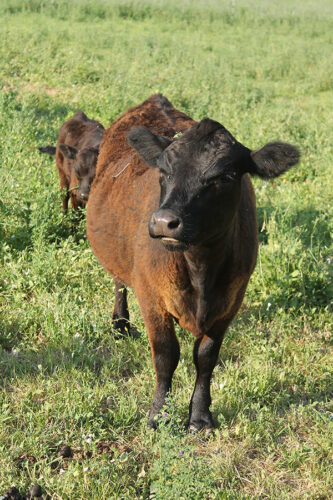
Julia M. Dendinger | News-Bulletin photo
The cows raised by Sublime Pastures are bergerons, marked by their short legs and squared off bodies.
They were recently granted an exemption from the U.S. Department of Agriculture to be able to process their chickens on the farm, since there aren’t any poultry processors in New Mexico.
A normal day for the couple is moving the animals to the next paddock, checking water tanks and putting out feed and mineral supplements for the livestock.
With her current four acres and an additional 10 acres the couple leases for grazing their small herd of cattle, Kirsten said she isn’t striving to grow their operation.
“I know there are a lot of people out there who have the same kinds of health problems I do. At the end of the day, not everybody can be farmers,” she said. “I love this, so if I can just do this and help people, if I can just work with animals every day, I’m set here.”
Calling herself “not so young,” Kirsten said the agriculture community needs young farmers, since many of the older generation is retiring from the business.
“We need to bring back farming to the community. We need to look at doing it in a diverse way. I love how many farmers we have here; props to them for doing this,” she said. “There are ways we can help each other improve and learn.
“It’s not like farming can just quit. If it stops, we’re in big trouble. After expenses, I make literally no money but I have food at the end of the week. I have beef and pork and chicken in my freezer and I’m able to eat.
“The motto I go by is ‘Healthy soil, healthy animals, healthy people.’ The easiest way to explain what this is that everything is interconnected — everything influences everything else, good or bad.”
Cowboy Country: Bosque Farms family
Living the Western lifestyle
Cowboy Country: Rocket Punch Farm
Regenerative & ecological-based agriculture
Julia M. Dendinger began working at the VCNB in 2006. She covers Valencia County government, Belen Consolidated Schools and the village of Bosque Farms. She is a member of the Society of Professional Journalists Rio Grande chapter’s board of directors.
